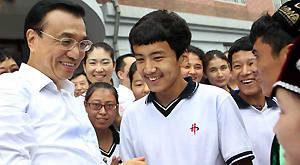Li Urges Education Equality
China Daily, September 10, 2013 Adjust font size:
Education authorities in Xinjiang started sending high school students to schools in inland regions in 2000 with the aim of giving them easier access to quality education and greater opportunities.
The total number of Xinjiang students sent to Dalian No 20 Senior High School reached 1,663, who represented about 10 different ethnic groups, including Uygur, Hui, and Mongol.
"We emphasized improving their language levels, both in Mandarin and English, since most of Xinjiang students were far behind the school's average level when they arrived," said Meng Fanwei, vice-principal of the school.
The school also organized many exchange activities, helping Xinjiang students fit into the new environment, he said.
Arslan Ablimit, a 16-year-old student from Xinjiang's Aksu prefecture who arrived at the school in August, said he has gotten used to living in Dalian, although he is occasionally homesick.
"Besides better education resources here, I feel great living in such a developed coastal city, which will help expand my horizons," he said.
In 2013, more than 9,100 students were sponsored to study in Xinjiang classes in 91 senior high schools in 14 provinces and cities, almost eight times more than the number in 2000, when China first launched the program.
Chu Zhaohui, a researcher at the National Institute of Education Sciences, said the country has made tangible progress on promoting educational equality by sending students in remote regions to schools in developed areas over the past decade.
"But such a model cannot be easily copied and blindly popularized in more regions in the future due to a limited education budget. Also, not all high school students are willing to study far from their hometowns," he said.
"So an essential way to realize education equality in the future is to give more support to those remote regions, letting local students have good schools and teachers equal to those in developed areas."
During his visit on Monday, Li also urged teachers to be not only transmitters of knowledge, but also role models of ethics and morality.


